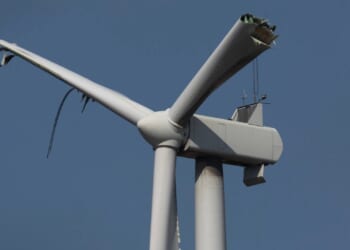George Trefgarne is chief executive of Boscobel & Partners, a consultancy and was previously economics editor of The Telegraph.
Kemi Badenoch’s speech on ditching the net zero carbon emissions by 2050 legal target may prove to be one of the most important she gives as Leader of the Opposition for two different, but related reasons.
The first reason is the relatively straight forward one that everything she said was correct. On the current trajectory, it is not actually possible to reduce our carbon emissions to zero, or net zero, or at least not without bankrupting ourselves.
This is not an academic point, but a real world one. According to the charity National Energy Action, 6.1m households are in energy poverty, which is to say they spend 10 per cent or more of their income on keeping warm and cooking, up from 4.5m before Russia invaded Ukraine.
Britain has some of the most expensive energy costs in the world and during the peak of the energy crisis, NEA reckons over 30,000 people, mostly elderly, died in conditions where energy poverty was a factor.
Energy is, literally, the stuff of life.
It underpins not only our wellbeing, but the economy. Cheap and abundant energy is also fundamental for service and manufacturing industry. Who can doubt that the Port Talbot steelworks would not have virtually closed, at the cost of 4000 jobs, if our energy costs were the same, as say, in America (where electricity is about a third of the cost here).
The explanation for why Net Zero is so expensive is very simple. Zero emission energy sources are, in general, intermittent. As the objective of the grid is to provide firm power, which is to say continuous, reliable energy when you need it, this means two things.
First, renewable power operators’ own revenue is unreliable and must be topped up with subsidies from consumer bills to make them financeable. And second, an entirely duplicative shadow energy system of power generation, in the form of natural gas and nuclear and hydro must be kept on hand. Yet the Net Zero regulations and tax regime punish companies for investing in natural gas, in the North Sea and elsewhere.
Second, the only solution to this is storage. But no technology exists to store electricity at the scale required.
No wonder, when it comes to our primary energy consumption (taking account not only of electricity but transport and industrial use of petrol, diesel and natural gas, some 74 per cent of it comes from fossil fuels like oil and gas. Another 11 per cent comes from biofuels, eg wood and waste, which are really fossil fuels too.
It is true that on certain windy and sunny days in the summer, renewables account for the majority of electricity generation. But wind and solar are no use on cold winter evenings when there is no wind, as there was on repeated days this winter.
The result is that the UK has some of the most expensive electricity prices in the world. According to the Government’s own figures, the UK price in October for domestic electricity was was 36.39p/kWh, about 80 per cent above the median of 20.22p/kWh for the 28 major world economies. UK prices are nearly 3 times those of the US and 3.5 times prices in South Korea.
Ed Miliband promised that his polices would reduce household energy bills by £300, but they have gone up by at least that since the election.
None of this is to deny man-made climate change, as Mrs Badenoch said.
It is to admit that it was crazy to put net zero into law in 2019 without any plan or costings or even a vote in Parliament. And she was one of the few people to say so at the time. It was, arguably, an act of intellectual cynicism and deception foisted on provincial Britain in the final days of the Theresa May government.
But we have to be honest and truthful.
Careful stewardship of the environment and the countryside on behalf of future generations is both popular and a duty. We should continue to reduce emissions where we can, but it may be we should be spending more on mitigation measures, such as flood defences, rather than wasting money on something which is not possible. Anyway, few people want to admit it, but a cold Atlantic island like the Britain might benefit from warming in some regards.
Then there is the second, big reason, that Mrs Badenoch’s speech was so important. That was the quality of the argument. It was a beautifully and thoughtfully written and delivered speech which made sense.
It has become commonplace in the media and Conservative circles to mutter that her leadership is underwhelming, she is not making an impact, that she is too easily duffed up by Sir Keir Starmer in the House of Commons and that, actually, Robert Jenrick should be leader. Though, interestingly, at the Centre for Policy Studies Margaret Thatcher Conference in London this week, Times columnist Fraser Nelson asked the assembled 200 guests what they thought, and 85 per cent said she should remain as leader.
What Kemi Badenoch’s net zero speech showed is that she is a serious leader for serious times. And outside the febrile atmosphere of Westminster her one-step-at-a-time, get it right style is the best strategy, when an election is four years away. Shooting from the hip might score easy points, but can also go spectacularly wrong too. The last thing the electorate wants is another Conservative leader who makes things up as they go along, only to make a total mess of things later.
Sooner or later the impact of ever higher energy prices will turn into an explosive political issue for Labour, as it has for other Governments in Europe.
When that happens, Mrs Badenoch will be ready, and hopefully with something reasonable and honest to say.






![Trump's Admin Guts Another ‘Rogue Government Agency with Zero Accountability’ [WATCH]](https://www.right2024.com/wp-content/uploads/2025/03/Trumps-Admin-Guts-Another-‘Rogue-Government-Agency-with-Zero-Accountability-350x250.jpg)
![‘We All Owe Him (Elon) a Huge Debt of Gratitude’ [WATCH]](https://www.right2024.com/wp-content/uploads/2025/03/‘We-All-Owe-Him-Elon-a-Huge-Debt-of-Gratitude-350x250.jpg)









